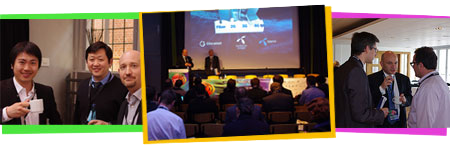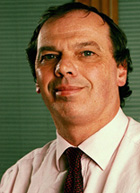|

PRESS RELEASE
LTE Forum 2012 Istanbul/Turkey June 2012 
Wrap-up of Conference Chairman
Alan Hadden (GSA)
Istanbul, June 13th 2012. LTE Forum 2012 was held in Istanbul on June 5-6, and was a great success. This was the latest of the widely acclaimed series of LTE Forum events which had already been held in Lisbon, Stockholm and Warsaw. The decision by HanseCom Media & Communication to locate their latest LTE Forum in Istanbul was masterful because Turkey is now actively preparing for the introduction of LTE. Turkey is a vibrant and innovative mobile communications market, and historically a country which provides strong signals to the region about market success and key trends.
Over 60 delegates attended the 1-day LTE Workshop on June 5, which featured highly informative and interactive sessions on the global LTE market, key technology and commercial aspects, spectrum and business models.
The following day (June 6) was for the LTE Forum conference itself, with 140+ delegates participating from Europe, Eurasia, Russia, the Caucasus - even from as far away as Trinidad and Tobago. Twelve presentations were given by top industry experts from many leading global manufacturers, network operators, a global industry trade association, consultants, and senior officials from the Turkish regulatory authority - BTK. Audience participation was high, generating probing questions which allowed speakers and panellists to share their insights and experiences and thus maximize the sharing of information.
The over-riding message is the need to maintain, and improve where possible, the user experience of mobile broadband, which must be constant, in order to grow the market. Technological innovation is needed to ensure more capacity is available, ubiquitous coverage is achieved (land, sea, air), more speed is delivered including at the cell edge, smaller cells, zero latency, more spectrum and higher spectral efficiency. Delegates heard that the amount of available spectrum is an economic differentiator for individual countries. Many stressed that it is also very important to protect current investments. The main evolution strategies were explained. It was noted that operators who invest in improving the efficiency of their GSM using latest technology innovations could free up spectrum for mobile broadband, e.g. in the 1800 MHz band. One operator presented results from its exhaustive GSM-LTE co-existence trial which proved that LTE incurred interference - even using the minimum frequency separation - does not affect GSM1800 services of the same or adjacent operators, and is lower than the intersystem interference.
Delegates learned that most operators in Europe are deploying or planning LTE in up to three frequency bands, i.e. using the 800 MHz digital dividend, 1800 MHz (refarmed) and newly allocated blocks of 2.6 GHz spectrum. New applications for LTE, including in the automotive industry, were highlighted and examined from the testing perspective. Mobile communication technologies like LTE are entering application environments beyond their original scope of person to person communication. In the general case devices support multiple technologies and need efficient and cost effective test strategies in order to ensure high performance operation in real life networks. The role of WiFi in the network for traffic offload, for example, and the potential benefits through partnerships were also explored.
There was debate also about the desired or required relationships with OTT players. Mobile operators may need to leverage the experience of the Internet for developing and deploying new services and business models to monetize mobile broadband, and to prepare internally for this phase. Some examples of how LTE is priced in the market today were presented and debated. The importance of IP Voice, initially using CSFB followed by VoLTE from next year, was also explained and discussed.
Senior representatives of mobile operators in the key markets of Germany and Russia brought their highly relevant market and technical experiences regarding mobile communications and LTE broadband into the discussions here in Turkey. Several leading international vendors brought in their global experiences. The decisions taken at the recent WRC-12 meeting concerning spectrum for mobile broadband were summarized, and the planned steps for ensuring more spectrum can be allocated in the next few years for mobile broadband services were described.
The Turkish regulator explained their planned spectrum and technology roadmap for the introduction of advanced mobile broadband technology to Turkey, including using LTE. Additional EGSM and 1800 MHz spectrum will be auctioned. The digital dividend will follow digital TV switchover which is scheduled for completion by June 17, 2014. The second digital dividend which will be discussed at WRC-15 is now being studied. Spectrum in the 2.6 GHz band is available and several trials using LTE are ongoing in Turkey. Spectrum in the 450-470 MHz band (2 x 5 MHz from September 2013), and in the 3.4-3.6 GHz band are planned for BWA services.
An Operators panel discussed winning strategies for LTE introduction.
BTK stated that no operators so far have formally applied to deploy LTE networks. However, that day is not far off. Locating the LTE Forum in Turkey will undoubtedly have helped decision makers and investors and may bring the date for commercial introduction of LTE services that much nearer. HanseCom already decided that the LTE Forum will return to Istanbul in 2013.
Alan Hadden, President of GSA
Conference Chairman – LTE Forum 2012, Istanbul |